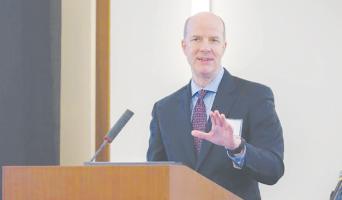“To what extent do treatments for prostate cancer impact sexual functioning? To a great extent,” Christian Nelson, PhD, Chief, Psychiatry Service, Memorial Sloan Kettering Cancer Center, New York, told participants at the 11th Annual Oncofertility Consortium Conference in Chicago.1 Most men with prostate cancer are diagnosed in the early stages of disease and have “survival rates approaching 100%” with early-stage treatments, but they are radical pelvic treatments, radical prostatectomy, or radiation. “Basically, all prostate cancer treatments impact sexual function,” Dr. Nelson stated.

Adrenaline from anxiety is the most potent anti-erection agent there is.— Christian Nelson, PhD
Tweet this quote
“The good news is we can help,” he said. “We have good medical treatments,” including oral medications and devices for men with erectile dysfunction. “But we need to integrate the psychological approach to help them get back in action.”
‘Give Me Back What I Had’
The inability to have erections firm enough for intercourse (erectile dysfunction) can persist years after treatment. A study of 1,288 men with localized prostate cancer who underwent radical prostatectomy found that 2 years after surgery, 78% did not have erections firm enough for intercourse and at 5 years, 72% did not.2
As Jeffrey Albaugh, PhD, APRN, explained in a related presentation,3 the number-one request from men experiencing erectile dysfunction after treatment for prostate cancer is “Give me back what I had.” Comments from patients interviewed 1 to 5 years after prostate cancer treatment for a study reported this past year in BMC Urology4 included: “You don’t wake up with an erection…and I miss that” and “I think about it every single day.” Dr. Albaugh is Director of the NorthShore University Sexual Health Clinic, Evanston, Illinois, board certified in urology as an advanced practice clinical nurse, and also certified as a sexuality counselor.
‘Feel Less Like a Man’
“We know from a number of studies, that erectile dysfunction is associated with depression and depressive symptoms,” Dr. Nelson stated, and that being bothered about erectile dysfunction does not just dissipate. Among 200 men assessed before and after surgery for prostate cancer, “the amount of bother at 2 months was exactly the same as at 2 years.” One of the questions asked was: Has this impacted your general happiness in life? “Men reported that yes, it does,” Dr. Nelson revealed. “They report they feel less like a man. They report their self-confidence is down. Erectile dysfunction permeates their life. It impacts them at the core of what it is to be a man,” he stressed.

Patients want to enhance intimacy, connectedness, and communication on all levels with their partner. This may or may not include sex.— Jeffrey Albaugh, PhD, APRN
Tweet this quote
Erectile dysfunction also causes relationship issues and concerns. It is important to work with couples to understand how partners communicate with each other. “Essentially, what happens is [the man’s partner] doesn’t understand why he is so upset about erectile dysfunction,” Dr. Nelson said. “The benefit of talking about this,” Dr. Nelson said, “is so at least they can understand their differences and try to develop some common ground.” Although his comments were “heterosexually focused,” he noted these principles can be applied to same-sex relationships.
There is a “sense of performance anxiety,” which can become “an anxiety erectile dysfunction cycle,” Dr. Nelson continued. “The anxiety about entering a sexual situation for a man starts to build if he is not confident he can get a firm erection. Adrenaline from anxiety is the most potent anti-erection agent there is. He becomes nervous, worrying. He is not enjoying it as much. He is not getting an erection. Then [his partner] becomes concerned about the anxiety he is experiencing and is not sure how to deal with this,” Dr. Nelson added. This cycle “can lead to behavioral and emotional changes for both the patient and the partner.”
Oral Medications and Local Therapies
Phosphodiesterase type 5 (PDE-5) inhibitors, such as sildenafil and tadalafil, can enable an erection “in about 60% to 70% of men with true physiologic erectile function,” Dr. Albaugh reported, “but the failure rates can be as high as 80% right after prostatectomy because communication between the brain and the penis is no longer clear” due to nerve damage. It can take an average of 2 years for the nerves to recover after surgery and if they do recover, the pills may work better with recovery. “The pills work like a double negative,” Dr. Albaugh explained. “They block the PDE-5 enzyme that inhibits the chemicals that make the penis erect. If we inhibit the inhibitor, now we have more chemicals in the penis.” With the right mindset and stimulation to the penis, these chemicals “are activated, and you have potential for better erections,” he said.
Because PDE-5 inhibitors “don’t always work after cancer treatment, sometimes we have to use a local therapy that works right on the penis,” Dr. Albaugh said. These therapies include the penile rings or bands, the vacuum pump, or injections.
The ring is “like a tourniquet that holds the blood in the penis during sexual relations,” Dr. Albaugh explained. It is most beneficial for men who can achieve an erection but have difficulty maintaining it. The patient must be able to get the ring on and off himself, and it should never be worn for more than 30 minutes.


Jeffrey Albaugh, PhD, APRN (top), and Christian Nelson, PhD, lecture at the 11th Annual Oncofertility Consortium Conference in Chicago.
The vacuum pump is placed over the penis, negative pressure pulls blood into the penis, and a tension ring is used to maintain the erection during sex. “The vacuum pump is noninvasive and with practice has a high success rate, but it definitely requires teaching, practice, and patience,” Dr. Albaugh said.
Vasoactive medications can be injected directly into the penis to dilate the blood vessels and engorge the organ. “Although it sounds unpleasant, millions of men are willing to undergo this procedure because the treatments have high efficacy rates and are not as painful as feared. In a study conducted by Dr. Albaugh among 60 men, on a scale from 0 to 10 (with 0 as no pain and 10 as intense pain), “40% of the men rated the pain 0,” Dr. Albaugh reported. The treatment “is not for everyone,” he admitted. “It takes work. People have to learn how to do it. But it can be life-changing for some people.”
Because these treatments can interfere with the spontaneity or natural course of sexual relations, it is important to discuss how patients can integrate them into their love lives. This might involve factoring in the time for taking pills or preparing devices.
Dr. Albaugh shares this advice with patients: “Regardless of whether you get an erection or not, work on sex and intimacy, and enjoy it, because the minute you start worrying about it, you get anxiety, anxiety equals adrenaline, and anxiety and adrenaline are erection killers—a physiologic response to a psychological threat.”
High Dropout Rate
Data suggest that “men avoid and drop out of erectile dysfunction treatment,” Dr. Nelson said. “Although PDE-5 inhibitors are effective, 50% of those with prescriptions do not refill them. One year after starting penile injections, 50% of men are no longer using them. According to self-reported data, 60% continued injections for 4 months, but only 33% at the rate specified by protocol of 3 times per week, he added. A more objective assessment method of counting the syringes used revealed that most men were injecting less than once a week, and only 10% were injecting 3 times per week.”
Dr. Nelson is involved in qualitative work exploring why men are avoiding or dropping out of erectile dysfunction treatment. “The cycle that starts with disappointment and shame related to erectile dysfunction leads to distress and depressive symptoms. There is fear and anxiety about entering a sexual situation without being confident you are going to get a firm erection,” he said. “The process can be humiliating, whether you need to use a pill, or you need to use an injection, because you never had to do it before. This leads to avoidance and dread” and “the quickest way to get rid of that anxiety is to say, ‘I am not going to do it.’ Although that works really well in the short term, it doesn’t work in the long term.”
Combined Therapeutic Approach
Dr. Nelson encouraged a combined therapeutic approach of medical treatment for erectile dysfunction with psychological treatment. Work is ongoing with an approach called “acceptance and commitment therapy,” which sometimes integrates mindfulness techniques. He emphasized “exploring the importance of sexuality with the patient and the partner.”
Encourage patients to “accept short-term anxiety for the long-term benefit or goal of entering into sexual situations again,” Dr. Nelson advised. “To diffuse anxiety and frustration, we highlight the potential barriers and talk about preventing them. That increases compliance with our penile rehabilitation program,” as has been suggested by data.
Talking With Patients
Dr. Nelson offered some guidelines for talking with patients about erectile dysfunction. “Education is important, but the importance of sexuality should be focused and explored by the patient. Instead of starting with the problem of erectile dysfunction, focus more on why is it important for the patient to get his erections back,” and ask about the value that has in his life. “Acknowledge the short-term anxiety. Forecast this for patients: You are going to be nervous. You are going to be stressed. You are going to be worried about this. That is okay. What is important is your willingness to enter into a sexual situation.”
He emphasized focusing on the long-term goals as opposed to the short-term anxiety. Discuss and highlight what might get in the way of using the treatments. Predict that patients will find excuses, he added, and then talk about the commitment to move beyond those excuses.
Intimacy and Connectedness
Not all men treated for prostate cancer will recover the ability to have an erection. Men who have erectile dysfunction because of damage to the cavernosal nerves, but not to the pudendal nerves, “can typically climax fine,” Dr. Albaugh said. “Those men can still enjoy that sensation of climax, and even with the prostate gone, in the absence of ejaculate, most men enjoy that climax feeling, which they describe as either diminished, different, or the same.” In fact, about 7% of these men report having a more intense climax after prostatectomy, he said.
Sex Therapy Resources for Patients Treated for Prostate Cancer
For patients in need of referrals to a sex or relationship therapist, Jeffrey Albaugh, PhD, APRN, Director of the NorthShore University Sexual Health Clinic, Evanston, Illinois, recommended checking the websites of the American Association of Sexuality Educators, Counselors, and Therapists (www.aasect.org) or the Sexual Medicine Society of North America (www.smsna.org). More detailed descriptions of medications and devices as well as “keys to success” in using them are included in Dr. Albaugh’s book, Reclaiming Sex & Intimacy After Prostate Cancer: A Guide for Men and Their Partners, which can be found at www.drjeffalbaugh.com and downloaded at no cost.
“The essence of sexuality is giving and receiving pleasure,” emphasized Dr. Albaugh. If intercourse is not an option, he helps patients explore other options that are enjoyable.
The lack of intimacy is what drives many people to seek help from health-care professionals, Dr. Albaugh said. “It is very distressing to people when they don’t feel connectedness, love, and intimacy with their partner. Patients want to enhance intimacy, connectedness, and communication on all levels with their partner. This may or may not include sex,” Dr. Albaugh said. “Intimacy is monumentally important to these couples. Intimacy sometimes becomes nonpenetrative, and they can become experts at ‘outercourse’ or nonintercourse types of sex.” ■
DISCLOSURE: Dr. Albaugh reported no conflicts of interest.
REFERENCES
1. Nelson C: Sexual health and cancer. 2017 Annual Oncofertility Consortium Conference. Presented November 16, 2017.
2. Penson DF, McLerran D, Feng Z, et al: 5-year urinary and sexual outcomes after radical prostatectomy: Results from the Prostate Cancer Outcomes Study. J Urol 179(5 suppl):S40-S44, 2008.
3. Albaugh J: Male sexual health in cancer patients. 2017 Annual Oncofertility Consortium Conference. Presented November 15, 2017.
4. Albaugh JA, Sufrin N, Lapin BR, et al: Life after prostate cancer treatment: A mixed methods study of the experiences of men with sexual dysfunction and their partners. BMC Urol 17:45, 2017.

